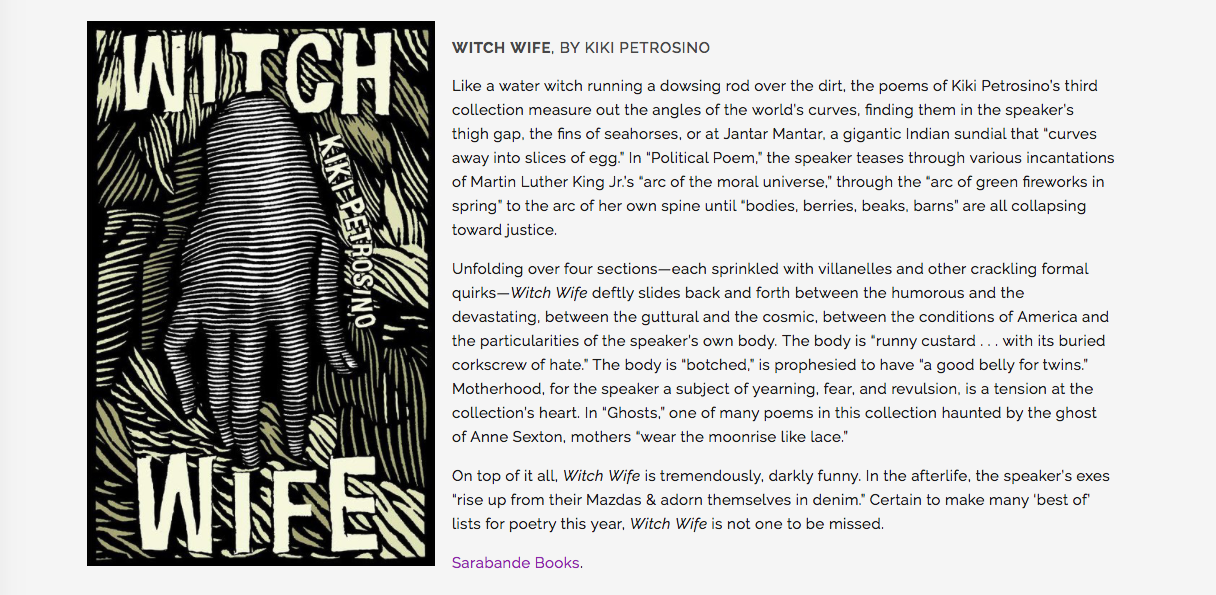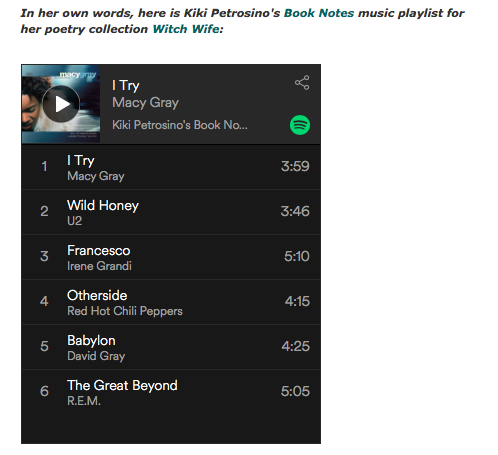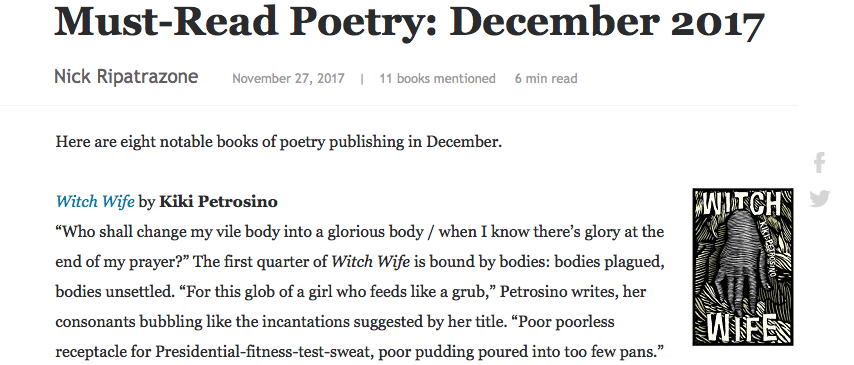Many thanks to Julie Wade for orchestrating such a wonderful series of interview questions for The Rumpus.
Witch Wife is on Poetry's April 2018 Reading List
New Essay for the International Writing Program Collections
Last year, I was invited to participate in the "To What Do I Belong" symposium in Tangier, Morocco hosted by the University of Iowa's International Writing Program and the US State Department. I wrote an essay, "In the Rooms of Monticello," as my contribution to the proceedings. Now the piece has been collected by the IWP on a special website. You can read my work and the writings of the other delegates--from around the world--who participated in the adventure.
Witch Wife Named One of Barnes & Noble's 25 Must-Reads for National Poetry Month
Witch Wife Reviewed in Fourth & Sycamore
Witch Wife Reviewed in New York Journal of Books
Witch Wife has received this review in New York Journal of Books.
Witch Wife Reviewed in The East Bay Review
Witch Wife has received a very attentive review by Luiza Flynn-Goodlett of The East Bay Review.
Black Genealogy Reviewed in Cleaver Magazine
I'm very grateful for this detailed and thoughtful review by Claire Oleson of my chapbook, Black Genealogy, in the current issue of Cleaver Magazine.
Witch Wife Reviewed in The Arkansas International
Witch Wife has received a wonderful capsule review in The Arkansas International.
"Like a water witch running a dowsing rod over the dirt, the poems of Kiki Petrosino’s third collection measure out the angles of the world’s curves, finding them in the speaker’s thigh gap, the fins of seahorses, or at Jantar Mantar, a gigantic Indian sundial that “curves away into slices of egg.” In “Political Poem,” the speaker teases through various incantations of Martin Luther King Jr.’s “arc of the moral universe,” through the “arc of green fireworks in spring” to the arc of her own spine until “bodies, berries, beaks, barns” are all collapsing toward justice.
Unfolding over four sections—each sprinkled with villanelles and other crackling formal quirks—Witch Wife deftly slides back and forth between the humorous and the devastating, between the guttural and the cosmic, between the conditions of America and the particularities of the speaker’s own body. The body is “runny custard . . . with its buried corkscrew of hate.” The body is “botched,” is prophesied to have “a good belly for twins.” Motherhood, for the speaker a subject of yearning, fear, and revulsion, is a tension at the collection’s heart. In “Ghosts,” one of many poems in this collection haunted by the ghost of Anne Sexton, mothers “wear the moonrise like lace.”
On top of it all, Witch Wife is tremendously, darkly funny. In the afterlife, the speaker’s exes “rise up from their Mazdas & adorn themselves in denim.” Certain to make many ‘best of’ lists for poetry this year, Witch Wife is not one to be missed."
Black Genealogy is Sundress Publication's "Best Dressed"
My chapbook Black Genealogy is a January 2018 "Best Dressed" selection from Sundress Publications. Read selections from the chap on The Sundress Blog.
Witch Wife Named Among the Best Poetry of 2017
David Orr, of The New York Times, has listed Witch Wife among The Best Poetry of 2017!
New Poem in The Nation
A couple weeks ago, my poem, "A Guide to the Louisa County Free Negro and Slave Records, 1770-1865" was published in The Nation. Thanks to poetry editors Carmen Gimenez-Smith and Stephanie Burt for giving this one a home. This poem will be part of my next book, tentatively titled White Blood, and based on research into my deep roots in rural central and northern Virginia.
Witch Wife is Consortium's Diverse Book of the Week
Many thanks to @ConsortiumBooks which has named Witch Wife a Diverse Book of the Week in their library newsletter. #WeNeedDiverseBooks!
A Pub Day Playlist to Celebrate Witch Wife
David Gutowski over at Largehearted Boy asked me to create an annotated playlist for Witch Wife. Check out the essay & listen to the songs on Spotify.
Welcome to the World, Witch Wife!
Interview in Hyype
Only three days from the official pub date for Witch Wife, I'm honored to answer Kelsey May's excellent questions for her blog, Hyype.
Review of Witch Wife: Publisher's Weekly
Witch Wife has received a starred review in Publisher's Weekly.
Review of Witch Wife: The Millions
Nick Ripatrazone of The Millions has reviewed Witch Wife and named it a Must-Read Poetry pick for 2017.
Witch Wife Announcement in Publisher's Weekly
My new book, Witch Wife, is listed among the Fall 2017 Poetry announcements in Publisher's Weekly.
Three New Poems in Grimoire
Three new poems, "The Child Was in the Woods," "Witch Wife," and "Prospera," were published in Issue 3 of Grimoire. These poems will appear in my new collection, Witch Wife, available now for pre-order.



















